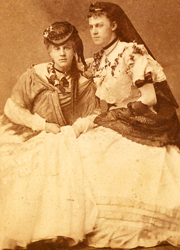| |
Comment on this article
A “Jubilee” that Ushered in the Theater
In the mid-1800s, Yale undergraduates gave thanks with a program of farce, drama, and hijinks known as the Thanksgiving Jubilee.
November 1998
by Judith Ann Schiff
Judith Ann Schiff is Chief Research Archivist at the Yale University Library.
Yale undergraduates can give thanks this month for a weeklong Thanksgiving break, a luxury that students of previous centuries would have surely welcomed. But those students of yesteryear had their own Thanksgiving tradition. It took place on a stage rather than around a family banquet table, and it eventually paved the way for undergraduate theater in the College.
As hard as it is to imagine Yale without theater, there was a time when treading the boards was considered an offense against the College. Reflecting Yale’s puritanical origins, the College Laws until the end of the 18th century held that “If any Scholar shall any where act a Comedy or a Tragedy, he shall be fined three Shillings, one Shilling if he shall be present at the acting of one; and if in acting he shall put on Women’s Apparrel, he shall be publicly admonished.” A version of this rule was printed in the College Laws until 1897, although it became less and less of a deterrent.
The event that broke down the theater taboo, the Thanksgiving Jubilee, evolved from respectable beginnings. In the 19th century, when the College year was three semesters long, the only vacation day between mid-September and the Christmas holiday was Thanksgiving. Where once students had gathered in the Chapel for a long-winded Thanksgiving Day sermon, they were increasingly able to travel home for the holiday as transportation improved, so the sermon was dropped by the mid-1800s.
But inevitably, a few students were unable to go home. To console themselves, they began to write parody sermons and speeches that were performed on Thanksgiving eve. By 1860, it had become an event named the Jubilee, and in that year was moved to Tuesday so that all of the students could attend. Set pieces evolved, such as the custom of choosing the shortest freshman for President and the tallest for Secretary, and the reading of a “Censor’s Report” by a senior holding an immense roll. The addition of comic poems and female impersonations led to the production of staged and costumed plays. As one contemporary student writer described it, “smut and vulgarity also grew apace, until it culminated in 1865 in the production of an indecent farce.” The offenders were suspended by the faculty, who also decreed that no female characters should be represented. Students got around the ruling by wearing gender-ambiguous Turkish costumes.
| |
 Frederick H. Baldwin, Class of 1872, and Frederick H. Hoadley, Class of 1870
Frederick H. Baldwin, Class of 1872, and Frederick H. Hoadley, Class of 1870 |
On November 16, 1869, a new standard of refinement was introduced with the admission of ladies to a special reserved section and the absence of tobacco smoke. First on the program was the usual election where the freshmen candidates were passed to the stage over the heads of the upper classes, followed by a witty Thanksgiving sermon, a “savory side-splitting farce” entitled A Race for Dinner, and a minstrel show. Then came what proved to be the hit of the vaudeville-flavored evening—a play titled A Pretty Piece of Business. Its elegant scenery and properties had been rented from a city theater. In the five-character play, the three female roles were played by Frederick H. Baldwin, Class of 1872 (seated left in the photograph above), Frederick H. Hoadley, Class of 1870 (seated right), and Robert Baldwin, Class of 1870. This carte-de-visite portrait is notable as the earliest known photograph of a Yale theater production. Both the “make up” and acting of the gentlemen were highly praised in a Yale Literary Magazine review that boldly stated: “We think this play may be safely styled the best piece of acting ever given in college.”
By 1880, the Jubilee had been taken over by the fraternities, which continued to hold elaborate fall productions into the 20th century. In 1899, a new tradition of Yale theater quality was born with the founding of the Yale Dramatic Association. “Real” undergraduate actresses, of course, would have to wait until 1969.  |
|


